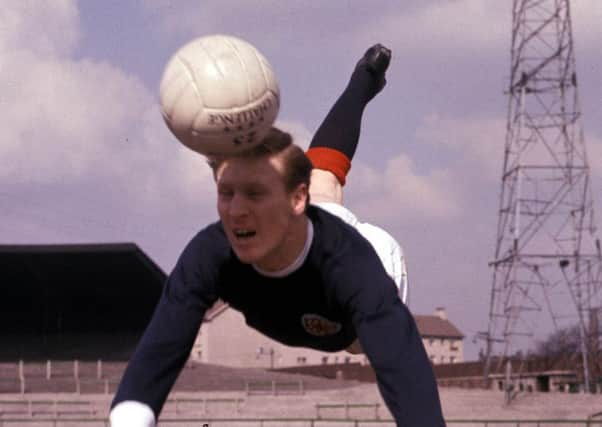Aidan Smith: Billy McNeill - a legend who fills all our memories


The first time I saw Billy McNeill in the raw was in 1968 when my team dared to take the lead against his Celtic with only a quarter of an hour of the match remaining. Even as a callow 11-year-old I probably knew the game wasn’t going to end that way. Celtic had strode on to the pitch like titans, looking so much bigger. I tried to tell myself this was an optical illusion caused by my low-down vantage-point behind the terrace wall and hooped shirts which seemed to make Celtic’s chests swell. But it was no use. McNeill equalised with a towering header, his speciality, and his team turned a 2-1 deficit into a 5-2 victory.
Three years later he was supposed to be vulnerable, creaking and past his best, as our centre-forward was going to confirm in the Scottish Cup final. What happened? McNeill sauntered upfield for Celtic’s very first attack, parade ground-proud as always. Another towering header would send his team on their way to an even more emphatic win. All of this was after 1967 when McNeill became the first captain of a British club to lift the European Cup. This is an anniversary year, the 50th birthday of one of Scottish sport’s great feats. But the celebrations will be tinged with poignancy following the news that the team’s noble leader is suffering from dementia.
Advertisement
Hide AdAdvertisement
Hide AdIt’s always a shock when a great athlete, a superb physical specimen in his pomp, is reduced by illness in later life. All the more so when he seemed to your young self like the tallest man alive. Only one man was capable of standing on the steps of that monolithic stadium in Lisbon and not being dwarfed by it. Only one man was capable of hoisting the European Cup above his head, surely the biggest of all trophies. There’s a cartoon show I liked around the time of Celtic’s success which featured a 50ft robot. The real Gigantor, though, was McNeill.
Does repeated heading of a football increase the risk of dementia? McNeill’s family, in revealing the extent of his condition, have called more research. As reactions go this is quite restrained. Studies carried out recently point to clear links between heading and dementia. You could call the family’s response dignified, which is a word often used about McNeill himself. Last year Stirling University found “small but significant changes” in brain function after footballers headed the ball 20 times with memory performance being reduced. And earlier this month scientists at University College London Institute of Neurology warned of the risks of heading and colliding with other players after carrying out post mortems on six footballers who’d developed dementia. All six had Alzheimer’s disease while four also showed signs of chronic traumatic encephalopathy, a degenerative condition associated with blows to the head.
Dementia has been dubbed football’s silent shame. Players from an era some call “golden” never made much money from the game. They might have sold their medals to keep themselves alive so all they’ll have left are their memories. They like to tell their stories to grandchildren and, when an anniversary of a notable match comes round, journalists like me. Sitting down with a legend is one of the tremendous privileges of this job. But the memories fade, or are knocked out of the participants. Sometimes the wives have to act as theatrical prompts, or the three of us will engage in detective work to piece together the yarns from a time when the ball was much heavier than it is now. The most cherishable interviews have often been with players surrounded by family members only too happy to fill in the blanks because they’ve heard the anecdotes many times, loved them every time. Sean Fallon, the ex-Celtic player and manager Jock Stein’s assistant during McNeill’s glory years, was one such collaborative effort. Same with the Hearts great Dave Mackay, and another from the Edinburgh club, Alex Young, who died yesterday.
Football has a duty of care to its employees but until recently hasn’t liked talking about dementia. The sport can argue that no-one knew there was a risk from heading just as no-one knew stadiums would become into death-traps. Football can’t say that any longer, with Gordon Smith, the former Scottish Football Association chief executive, predicting the sport – now only too aware of the dangers – could ask players to sign disclaimers to prevent them suing over dementia.
Back when McNeill was heading just about every ball, I remember a photo in one of my football magazines of Jeff Astle of West Bromwich Albion with his head sunk into the leather sphere. This seemed to be a trick of the camera shutter-speed or maybe the ball was soft. Then again it might have been the perfect illustration of the risks. In 2002 the coroner at the inquest into Astle’s death ruled he’d suffered an “industrial disease”. A promised study into the heading issue, involving both England’s Football Association and the footballers’ union, was never published. And last year, as it was confirmed that four of the eight surviving outfield players from England’s 1966 World Cup-winning team were suffering memory problems, Astle’s daughter Dawn said: “For a coroner to say Dad’s job killed him and, 14 years on, to be no further forward, is shocking. It was a landmark decision that would have had earthquake repercussions in any other industry. It feels like a huge conspiracy.” Just as there was sadness surrounding England’s anniversary so there will be at Celtic’s. Hopefully McNeill’s family will take comfort from this outpouring of affection. He may forget but we never will.